- Home
- Janice Kay Johnson
Mommy Said Goodbye Page 7
Mommy Said Goodbye Read online
Page 7
Craig guessed her attempts to help Brett might slam to a stop. Interviewed afresh, reminded of police suspicions, Julie’s friend wouldn’t want her son having anything to do with Julie’s husband even if she did feel sorry for Brett.
Robin wouldn’t be breezily friendly on the sidelines anymore. She wouldn’t touch his arm, read his mind, ally herself with him.
He felt pathetic to discover how much he minded, how much simple human kindness had meant to him.
Maybe the time had come to put the house on the market and move. To hell with the police. Short of arresting him, could they stop him? Maybe he’d been cooperative too long. There had to be a way for the kids and him to start over.
He couldn’t see that happening here, in Klickitat. Once again, in his grief, he felt anger. This time at Robin McKinnon, who had given him hope, but would soon snatch it away.
CHAPTER FIVE
“THAT SON OF A BITCH.” Ann glowered at the passing scenery. “Did you hear him? He was threatening us!”
“Was he?” Diaz said mildly. “Calling your lawyer is a constitutional right.”
She turned her impatient stare on her new partner, behind the wheel of the unmarked car. “Are you on his side?”
“Side?” He glanced at her. “Do you always make up your mind before you start an investigation?”
He was right. Of course he was right. Shamed, she held her silence for ten seconds or so. Then she burst out, “This isn’t just any investigation! You know how much it meant to Dad.”
“Yeah, I do. I thought he let it get too personal.”
She gaped. “You don’t think he was a good cop?” The very idea was heresy.
“I didn’t say that.” Diaz frowned and drummed his fingers on the wheel. “I admire the way he stuck to this case. He wanted to see justice for Julie Lofgren. But I sometimes wondered…”
“What?”
Sounding reluctant, the other cop finished, “Why he was so sure the husband killed her.”
“Don’t you ever have a gut feeling?”
“Yeah. Sure I do. But on this one, Michael got personal. Real personal. He didn’t like Lofgren. He went on about the ridiculous salaries pilots make, how they’re driving the airlines into the ground. ‘Spoiled brats,’ he said. Spoiled…well, that doesn’t mean murderer.”
“Lofgren’s cocky,” Ann argued.
“Did you think so? He looked pretty beaten down to me.”
“We’re getting to him.” She wanted to believe that. He’d crack. Sooner or later, he would give himself away.
“You’re not your dad.”
She bristled. “Meaning?”
“Let’s…just start fresh. Okay?”
“I’m not going to railroad him, if that’s what you’re saying.”
He spared her another glance from his dark, unreadable eyes. “I didn’t say that. I’m suggesting you keep an open mind, that’s all.”
Tempted to keep arguing, she knew deep down that he was right. She wanted this one for a lot of reasons. To prove herself, mostly. To lay on her father’s grave like a dozen red roses. But she had started with an assumption—her father’s assumption, not hers.
She hadn’t liked Craig Lofgren, either, but she’d been so sure she wouldn’t, he could have had a smile like Russell Crowe’s, and it wouldn’t have melted her. Even if she believed Lofgren had killed his wife, she needed to take a step back. Her father had hit a brick wall on this case. Maybe, if she tried to start as though this were some case handed to them, not one she’d heard about for a year and a half, she would find some way around that wall, or a chink in it. If she put on her father’s glasses, she’d see only what he saw.
And fail where he failed.
“Yeah. Okay,” she conceded. “I wanted…”
His voice gentler, Diaz nodded. “To finish something that meant a lot to your dad. I get that.”
“Where are we going?” She looked around.
The town of Klickitat was just waking up from the 1950s. Golden arches and a chain hardware store had risen on the outskirts, but the main street hadn’t changed in half a century. Well, that wasn’t quite true. Antique stores and a quilt shop had replaced the small furniture and department stores of an earlier era. Nonetheless, the couple of cafés seemed busy, a one-screen second-run movie theater defied the multiplex that had sprung up on the outskirts, and parking was hard to find.
“A couple of the neighbors work downtown. Figured we could start by talking to them.”
She nodded. Somehow, in her mind, she hadn’t gotten beyond interviewing Lofgren. But they’d go at this methodically. Someone, somewhere, knew something. They always did.
“Who first?”
First was the only neighbor who had actually been home the day of Julie Lofgren’s disappearance. She supposedly hadn’t seen or heard anything. “But, hey,” as Diaz put it, the woman hadn’t been interviewed since the early days.
Lynn Adams lived across the street and a couple of houses down from the Lofgrens. She owned one of the half dozen antique stores that made Klickitat a popular destination.
Ann guessed antiques were okay, but the stuff in this store looked like it had taken a beating. The furniture was all painted white and banged up, metal shelving had rusty dings and faded silk flowers leaned drunkenly from chipped pitchers. It all looked garage sale, but the prices were magnified twenty times.
Summoned by the skinny kid behind the jewelry counter, Lynn Adams emerged from a back room. Ash blond hair coifed and sprayed, she was an attractive woman in her fifties, at a guess, although she was fighting to hold on to her forties. Her forehead was a little too smooth. Ann wasn’t experienced enough to guess whether she’d had a face lift or a Botox injection.
“May I help you?” When Ms. Adams heard their purpose, she nodded slowly. “Come on back. I have a small office.”
Following her, Ann paused at a glass case that held some tiny, finely detailed porcelain boxes, but flushed when she caught her partner’s eye and hurried to catch up. Stupid, she told herself. Women cops did not admit to girly tastes.
She secretly resented it when Diaz nodded her to the only chair facing the beat-up oak desk that darn near filled the roughed-in cubicle. He leaned one shoulder against the door molding and slouched there.
Lynn Adams sat behind the desk and faced them. “What do you want to know?”
Ann pulled out her notebook and flipped it open. “Are you aware the investigating officer died?”
“The papers were full of it.” Her voice had an edge of fear. “We thought maybe without Sergeant Caldwell, Craig Lofgren would get away with killing his wife.”
“Over Ann’s head,” Diaz said in his calm, deep voice. “We’ll continue to investigate, ma’am, but at this point we’re still in the dark as to what happened to Mrs. Lofgren. Perhaps you’d help by telling us what you remember about that day. You weren’t working?”
“I just opened this shop a few months ago.” She smiled with a hint of smugness. “My husband is an attorney. I don’t need to work. But I’ve always had a good eye, and John finally suggested I go into business.”
“I see,” Diaz said. “That particular day? Do you recall your plans or what you actually did?”
“Of course I recall it!” She looked offended at the idea that she’d forget a red-letter day. “With all the fuss later, naturally I’ve thought back a million times.”
With some impatience, Ann prodded, “And?”
“I went into town first thing. That’s the last time I saw Julie. She was just pulling into her driveway in that red van of hers. I assumed she’d run the kids to school and maybe done some errands of her own on the way home. We waved.”
“And you were gone…how long?”
“Maybe two hours. I picked up some dry cleaning, bought groceries and prowled an antique store. Just for fun, you know.”
Diaz asked, “And did you pass her house on your way home?”
“I always look at people’s yards as I g
o by. It was spring, remember. The Lofgrens weren’t gardeners, but I did notice how pretty the flowering cherry between their house and the Lyles’ next door was.”
“But you didn’t see Julie or any sign of activity?” Ann asked.
“I didn’t see a soul. I went home, unloaded my groceries and the clothes I’d picked up at the dry cleaners, and then decided to putter in my own garden. I put in several hundred bulbs every fall. I take pride in my garden.”
Ms. Adam’s tone of self-satisfaction suggested that she gardened competitively. If someone else on the block put in a hundred daffodils, she’d be sure she planted a hundred and twenty.
“So you were actually outside for some of the day? In the backyard, or the front?”
“Mostly the back.” She sounded regretful; she would have liked to have witnessed the crime.
“I presume the neighborhood is pretty quiet at that time of day.”
“Well, I do remember the Quinns behind us had left their terrier outside again, and he barked all day long. We’ve asked them again and again…” Her mouth crimped.
“Does the dog bark nonstop, or because he heard you?”
“Oh…” She gave a huff of displeasure. “I suppose he’s noisier when I’m outside. He carries on when the school bus comes.”
“And when other cars pass?”
Her expression changed. “Well…yes. I suppose so.”
“Do you remember hearing vehicles pass?”
For the first time, she looked as if she were genuinely trying to see the day anew. Eyes unfocused, she said, “Yes. Yes, I think several cars went by. And a UPS truck. I caught a glimpse between the fence slats.”
Ann hid her excitement. Nowhere in her father’s extensive notes was any mention of a UPS truck. “Did it stop on your block, to your knowledge?”
She frowned. “Why, I think it might have. Is that important?”
“Probably not, but it gives us another potential witness.”
“I don’t know how I forgot back then.”
Juan Diaz asked, “Do you have any idea which house it stopped at?”
Ms. Adams made a humming sound as she thought. “Not right next door. I’d have heard the doorbell. But somewhere on the Lofgrens’ end of the block. The truck came back a few minutes later.”
They learned nothing else from her. She hadn’t noticed the few cars that passed. She hadn’t heard gunshots, screams or sounds of an altercation. She’d gone in and taken just a short nap, she admitted, before the shouts of kids getting off the school bus woke her.
She also admitted to not knowing the Lofgrens well. No, she wouldn’t exactly call herself a friend; she’d met them at block parties. They waved in passing. She didn’t know anything about the state of their marriage, although their nearer neighbors had told her about the loud fight the night before Julie’s disappearance.
Rather than hear about it secondhand, Ann and Juan excused themselves and walked the block and a half to the real estate office owned by one of the Lofgrens’ next-door neighbors.
Gil Beckman was just ushering clients out when they arrived. “Good timing,” he said heartily. “I can give you five minutes.”
No more than forty-five, he was soft around the middle with twinkling eyes. His engaging smile didn’t altogether convince Ann that he was genuinely delighted to have them in his office.
Sure, he remembered the altercation he’d overheard. “It was the first and only time I ever heard Craig and Julie raise their voices. They weren’t that kind. Never yelled at the kids, even.”
He’d believed he knew them pretty well, until Julie vanished and her husband came under suspicion. “The usual.” He shrugged. “We watched each other’s houses when we went on vacation, borrowed the mower when the other fellow’s wouldn’t start. Craig and I played a round of golf together a couple of times.”
They’d socialized a few times when he and his wife first bought their house, but that relationship just petered out. “Wife and I don’t have children, so I guess we just didn’t have much in common. Craig’s schedule had him away on weekends often, too.”
“Did you ever give any thought to their marriage?” Ann asked. “In the sense that you noticed they were loving, or that things were strained?”
He laughed. “You should probably talk to Carol about that one. Women notice stuff like that. Anyway, I didn’t see the two of them together much the last couple years. I thought everything was fine. That night, when we heard them fighting, Carol said she wasn’t surprised, that Julie had confided some frustrations to her.”
He gave them Carol’s card. She was a mortgage officer at the Washington Mutual Bank here in town.
Diaz leaned forward. “Please tell us about the quarrel you overheard. Could you hear what they were saying?”
“Just a word here and there. Mostly her. She screamed something about smothering, which got me sitting up, but the wife pointed out that Julie couldn’t carry on like that if he actually was squeezing her throat. Caught a few profanities, mention of the kids…” He shrugged.
Ann frowned. “We’ve gone through the notes left by the original investigating officer. I seem to remember you told him you heard Craig Lofgren threaten to kill his wife.”
“Me?” He looked surprised. “Heck, no! Just that thing about smothering. And that was her, not him.” He chuckled. “Can’t imagine a man bellowing, ‘I’m going to smother you!’”
“No.” Ann gritted her teeth. Was he lying now? Or had he lied then, in the excitement of being involved in high drama?
She and her partner thanked the Realtor and left.
“Let’s drive,” Diaz said. “Washington Mutual’s down at the other end of town.”
Ann nodded. She waited until they were in the car before she asked, “Do you think he was lying?”
“Lying?”
The raised brows were starting to irritate her.
“Yes, lying. About whether he heard an actual threat or not.”
Diaz shrugged. “I had the impression he was being straight.”
Damn it, she had to agree. Which left a gaping discrepancy.
A sleek, attractive businesswoman in a red suit with a skirt short enough to bare long elegant legs, Carol Beckman was able to commandeer a break room so that they could talk privately. When she sat, crossing her legs with slow deliberation and no attempt to tug at her hem, Diaz watched with interest. If Ann had been closer, she’d have jammed her elbow in his ribcage.
Maybe her glance had the same effect, because he cleared his throat and she thought a flush tinged his high cheekbones.
“Ms. Beckman, we just spoke to your husband about his recollections concerning the altercation you heard between Craig and Julie Lofgren the night before her disappearance. He felt that you knew the couple better than he did and were more observant of subtleties because you’re a woman.”
Carol Beckman flashed a flirtatious smile at him. Ann might as well not have been in the room. Heck, she was invisible next to a woman like this, with her dark hair drawn into a sleek roll on the back of her head, her vivid makeup, the diamond earrings winking on her earlobes. Most of the time, Ann was comfortable with herself and with the necessity of suppressing her femininity to fit into a man’s world. Moments like this, she suspected she didn’t have to; she just didn’t know how to make men flutter like moths. Yeah, she’d catch hell if she were caught being girly. Being womanly might be another story.
If only she knew how.
“Julie and I weren’t close friends, but we chatted when we were out getting our mail at the same time or just coming or going. I had coffee with her the week before…” She swallowed. “She grumbled about her husband. She said she felt like a single parent, that he wasn’t interested in shouldering a fair share of responsibility.”
Even given her prejudice against him, Ann thought that didn’t sound fair. The man was earning the household income, after all. Unless he wasn’t helpful when he was home, she reminded herself.
&nb
sp; “I had the impression they had other problems,” Carol Beckman continued. “She looked unhappy. Fidgety. On the verge of tears. But she didn’t want to say more. Her little girl was in and out, and I assumed that was why.”
“The quarrel took place…” Diaz glanced down at his notes. “In the late evening?”
“That’s right. Gil and I were going to bed. It was a nice night, so we had our window open. I remember he was sitting on the edge of the bed taking his socks off when Julie yelled something about being smothered.” She smiled. “He leaped to his feet with nothing on but Jockey shorts and one sock, ready to rush to the rescue. I patted his arm and persuaded him to let them argue in peace.”
“How much could you hear?”
She made a moue. “Honestly, not much. Craig’s voice was loud, but a deep rumble. You know. Hers was more piercing, so I could hear words here and there. Then slamming doors.”
“From the tenor of what you heard, were you alarmed?”
She hesitated. “Well…no. I mean, our neighborhood isn’t the kind where you hear couples fighting every night, so we were shocked, but… Oh, what married couple doesn’t occasionally raise their voices?”
Ann wouldn’t know. She’d never been married, and her mother had died when Ann was ten. She stole a speculative look at her partner, whom she knew was divorced. Somehow she couldn’t picture him…well, fiery enough to bellow at any woman. He was too…controlled.
Face expressionless, he nodded. “Did you see either of the Lofgrens the next day?”
She shook her head in apparent regret. “No sign of them. Of course I was at work all day. I didn’t know there was anything wrong until Craig rang the doorbell wondering if we’d seen Julie.”
“Did he appear worried?”
She wrinkled her nose. “More annoyed, I would have said. He gave a rather curt nod when we said no, thanked us and left.”
Ann spoke up for the first time. “Ms. Beckman, the investigating officer indicated in his notes that either you or your husband said you’d heard Mr. Lofgren threaten his wife that night.”
She was exasperated to see that Carol Beckman wasn’t the only one to appear startled by the reminder that she was present. Diaz actually started.

 Home Deadly Home
Home Deadly Home From Father to Son
From Father to Son All the Lost Little Horses (A Desperation Creek Novel Book 2)
All the Lost Little Horses (A Desperation Creek Novel Book 2) Hide the Child
Hide the Child Within Range
Within Range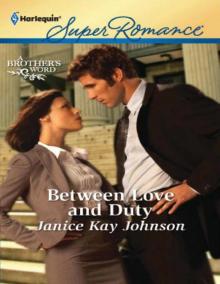 Between Love and Duty
Between Love and Duty First Comes Baby
First Comes Baby Charlotte's Homecoming
Charlotte's Homecoming In A Heartbeat (HQR Superromance)
In A Heartbeat (HQR Superromance)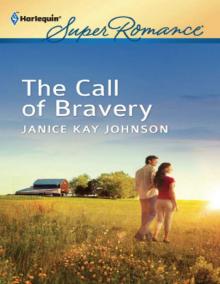 The Call of Bravery
The Call of Bravery In Hope's Shadow
In Hope's Shadow Anything for Her
Anything for Her Harlequin Superromance September 2014 - Bundle 1 of 2: This Good ManPromises Under the Peach TreeHusband by Choice
Harlequin Superromance September 2014 - Bundle 1 of 2: This Good ManPromises Under the Peach TreeHusband by Choice The Baby Agenda
The Baby Agenda More Than Neighbors
More Than Neighbors Her Amish Protectors
Her Amish Protectors All That Remains
All That Remains Whisper of Revenge (A Cape Trouble Novel Book 4)
Whisper of Revenge (A Cape Trouble Novel Book 4) In a Heartbeat
In a Heartbeat A Mother's Claim
A Mother's Claim Because of a Girl
Because of a Girl Back Against the Wall
Back Against the Wall Dangerous Waters
Dangerous Waters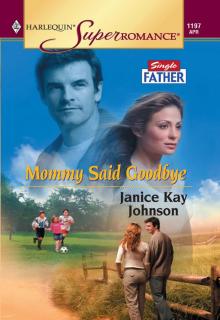 Mommy Said Goodbye
Mommy Said Goodbye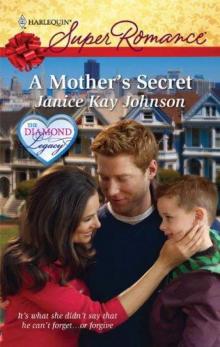 A Mother's Secret
A Mother's Secret See How She Runs (A Cape Trouble Novel Book 2)
See How She Runs (A Cape Trouble Novel Book 2) Plain Refuge
Plain Refuge Bringing Maddie Home
Bringing Maddie Home For the Girls' Sake
For the Girls' Sake Through the Sheriff's Eyes
Through the Sheriff's Eyes Yesterday's Gone (Two Daughters Book 1)
Yesterday's Gone (Two Daughters Book 1) All a Man Is
All a Man Is Harlequin Superromance January 2014 - Bundle 1 of 2: Everywhere She GoesA Promise for the BabyThat Summer at the Shore
Harlequin Superromance January 2014 - Bundle 1 of 2: Everywhere She GoesA Promise for the BabyThat Summer at the Shore No Matter What
No Matter What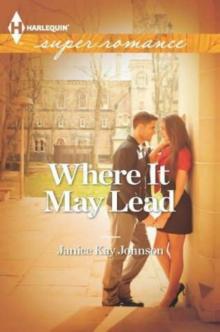 Wakefield College 01 - Where It May Lead
Wakefield College 01 - Where It May Lead Someone Like Her
Someone Like Her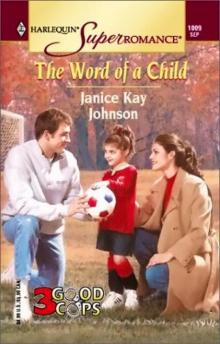 THE WORD OF A CHILD
THE WORD OF A CHILD Harlequin Superromance May 2016 Box Set
Harlequin Superromance May 2016 Box Set Open Secret
Open Secret The New Man
The New Man Finding Her Dad
Finding Her Dad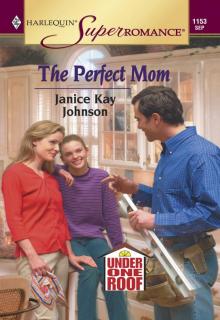 The Perfect Mom
The Perfect Mom All Through The House
All Through The House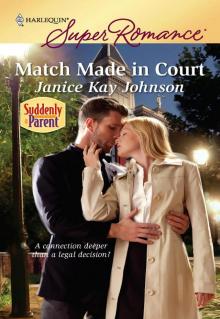 Match Made in Court
Match Made in Court Making Her Way Home
Making Her Way Home From This Day On
From This Day On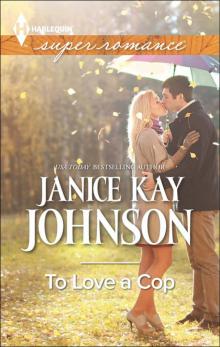 To Love a Cop
To Love a Cop The Hero's Redemption
The Hero's Redemption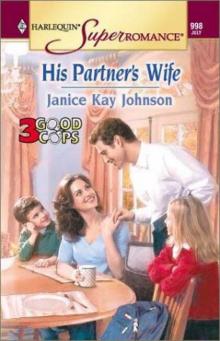 HIS PARTNER'S WIFE
HIS PARTNER'S WIFE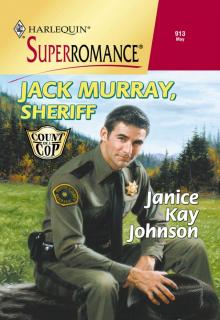 Jack Murray, Sheriff
Jack Murray, Sheriff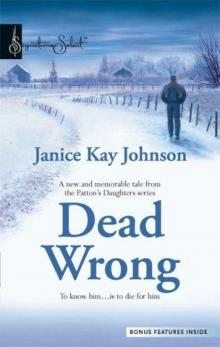 Dead Wrong
Dead Wrong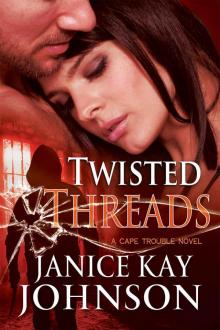 Twisted Threads (A Cape Trouble Novel Book 3)
Twisted Threads (A Cape Trouble Novel Book 3)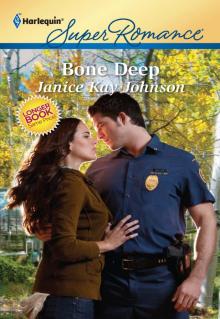 Bone Deep
Bone Deep The Closer He Gets
The Closer He Gets With Child
With Child Whose Baby?
Whose Baby? Kids by Christmas
Kids by Christmas